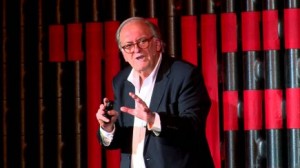My very good client BTG plc created a habit of getting leadership teams together to race boats for a day, in serious waters, to race, of course. The coaching team are of Olympian level, indeed some of them are now part of the British Olympic Team. They get the instructions first thing in the morning, get to do some training in the water and then racing for the rest of the day. Some people may be sportive, some may have never been in a boat before. After the long day, the dinner, the social aspect and a good night’s sleep, the next day the team is confronted with their own business situation to apply any learning from the day before. It works brilliantly.
There is an extraordinary immediate (organizational and leadership) learning from the model, which I’d like to unpack. The whole experience can be broken down into 4 components. I will explain and at the same time, I will make the comparison with what is more or less standard in our business life.
- Minimal instructions. The early morning class on racing is beautifully done, but it is one hour, max. There you have ‘all you need to know’ from safety to rules of racing; from winds to manoeuvring; from strategy to tactics. BTG calls this the ‘get it’ part. Compare that with our obsession with having a perfect briefing, with perfect data, with all the dots in a row and boxes ticked, before we start doing anything.
- Minimum sense making. Nobody receives the total wisdom on racing in an hour, there is no room for absolutely everything to make sense. It just makes enough sense to assume that other things will emerge. Enough sense to act. Compare this with our usual need to obtain maximum comfort. Is everybody on board? Everybody aligned? Does management support this and that? Are we sure that this is what the CEO wants? Have we double checked with the US? We spend our organizational life creating ‘packaged comfort’ before we act.
- The magic trust comes in. If the team has a decent level of trust, between their members, the magic sparks. You trust that others will have understood, that others will know what to do, that others will help and jump in if needed. No trust, this is where it all breaks down, or at least starts showing some cracks. In our organizational life trust is also the fuel. Nobody quite knows how to create it but you’ll see it when you see it, or you won’t. In BTG racing sessions, teams with intrinsic low or poor trust in real life, perform significantly worse in the waters. Interestingly, the coaches who may not know about the teams themselves in real life, can spot and predict a bad business execution by seeing what happens in those boats. And they are always right.
- Then you go, go, go. And recalibrate and execute. BTG calls these in several ways: to be ‘on it’, to ‘look out’ and to have the ‘appropriate bandwidth’. It is an imperfect world. As a guest, I have attended sessions where in the morning and during the training bits we have dealt with all possible winds and associated manoeuvring, to get into the race itself and find zero wind, nothing moves whatsoever. Prepared for high winds, what do you do with the lack of it. Does it sound like business as well?
I am incredibly sceptical of ‘sports analogies’ for business. This one works, because it is not an analogy, it is real experience of a full imperfect world, in a day with immediate, transferable. unavoidable learning.
Dealing with the imperfect, the unpredictable, the ambiguous is part of today’s business life. Part of my serious leadership development toolkits. And for the imperfect, the unpredictable and the ambiguous, people still seek perfect training, perfect guarantees and perfect comfort. That is old school.
________________________________________________________________________________________________
Managing the Covid-19 pandemic using Viral Change™ principles. 12 Rules you can apply.
Some further reading for the weekend….my recent paper which addresses the non-medical management of the pandemic through the lenses of large scale behavioural and cultural change principles, as practised by the Viral Change™ Mobilizing Platform for the last 20 years, in the area of organizational change.
12 Rules For A Behavioural Counter-Epidemic To Deal With Covid-19 [1]
A viral epidemic for which there is no immediate cure, only ways of managing it, can only be controlled by a counter behavioural epidemic.
_______________________________________________________________________________________________
Dr Leandro Herrero is the CEO and Chief Organization Architect of The Chalfont Project [2], an international firm of organizational architects. He is the pioneer of Viral ChangeTM, a people Mobilizing Platform, a methodology that delivers large scale behavioural and cultural change in organizations, which creates lasting capacity for changeability.
Dr Herrero is also an Executive Fellow at the Centre for the Future of Organization, Drucker School of Management. An international speaker, Dr Herrero is available for virtual speaking engagements [3] and can be reached at: The Chalfont Project [4].
His latest book, The Flipping point – Deprogramming Management [5], is available at all major online bookstores.
